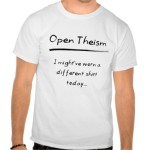We run our website the way we wished the whole internet worked: we provide high quality original content with no ads. We are funded solely by your direct support. Please consider supporting this project.
What is the significance of Isaiah 5:3–7?
The Lord describes Israel as his vineyard. Referring to himself, he says that the owner of the vineyard loved his vineyard and did all he could to care for it. “[H]e expected it to yield grapes, but it yielded wild grapes” (vs. 2). Then the Lord asks, “What more was there to do for my vineyard that I have not done in it? When I expected it to yield grapes, why did it yield wild grapes?” Because it unexpectedly failed to yield grapes, the Lord says “I will remove its hedge and it shall be devoured” (vs. 5).
According to the classical view of foreknowledge, the Lord could not express the conviction that he “expected” the vineyard to produce grapes, because he would have known from all eternity that it would not. If we rather trust that the Lord speaks with integrity, we must conclude that he genuinely thought something would take place which did not take place. This precludes accepting the notion that God foreknew everything that was going to transpire. God can’t sincerely “expect” what he foreknows will not happen. (See Jer. 3:6–7, 19–20).
Category: Q&A
Tags: Open Theism, Q&A
Topics: Open Theism
Verse: Isaiah 5
Related Reading

Are You a Church Misfit?
Romain Guy via Compfight Here’s a lovely reflection from Rachel Held Evans on the experience of finding that your questions are unwelcome in church. Evans is bumping up against this material as she reads Barbara Kingsolver’s Flight Behavior. I suspect this kind of experience is much more common that we’d like to admit. Can you…

A Calvinist and an Arminian walk into a bar…
Toby Bradbury via Compfight Roger Olson posted A Conversation between a Calvinist and an Arminian about God’s Sovereignty that we thought was dead on. In fact, we kind of wonder if Roger is bugging some of the conversations we’ve had. Déjà vu much? And since Roger has argued that Open Theism should be included under the broader umbrella of…

How do you respond to Isaiah 45:7/Lamentations 3:37–38?
The Lord says,“I form light and create darkness, I make weal and create woe; I the Lord do all these things” (Isaiah 45:7) “Who can command and have it done if the Lord has not ordained it? Is it not from the mouth of the Most High that good and bad come?” (Lamentations 3:37-38) Calvinists…

What is the significance of 2 Chronicles 32:31?
“God left [Hezekiah] to himself, in order to test him and to know all that was in his heart.” God tests his covenant partners to discover whether they will choose to remain faithful to him, an exercise that is absurd if God exhaustively foreknows exactly how faithful every person will choose to be. If the…

When does salvation happen?
Question: I grew up in a strict, fundamentalist community and our whole goal in life was to get people to pray “the sinners prayer.” Once they prayed this prayer, we believed, they were “saved.” But the vast majority of these people went on living like nothing happened. I’m now questioning if this is the right…

